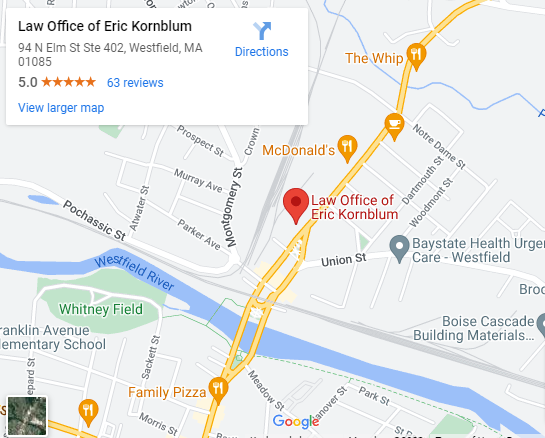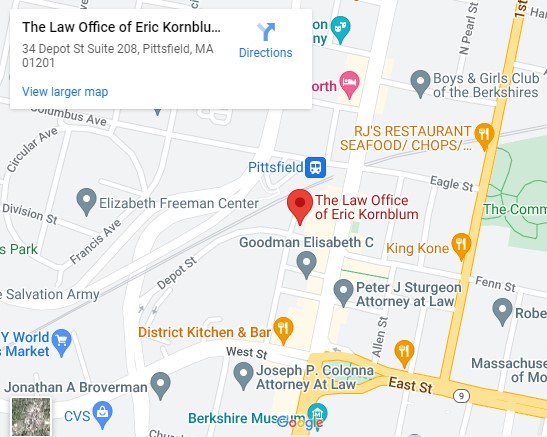Section 341 of the bankruptcy code stipulates that those who have filed for bankruptcy are required meet with the bankruptcy trustee and their creditors in what is known as the 341 meeting of creditors. While the name has a slightly clinical and authoritative tone to it, it’s generally not as bad as it sounds. The trustee leads the meeting as a representative of the court, swears everyone in, and then will ask you questions concerning your debts, income, and recent purchases.
Westfield bankruptcy lawyer Eric Kornblum can help you through the process and get your debt problems under control.
Who Will Attend the Meeting of Creditors?
There are three distinct parties at the table. Those include:
You and your lawyer,
The trustee,
And your creditors.
While the court appoints the trustee, he or she is not necessarily an impartial party. If you’ve filed for Chapter 7, the trustee gets paid a percentage of the value of your assets that he can legally liquidate. If you’ve filed for Chapter 13, the trustee and your creditors will review your reorganization and repayment plan. Your creditors have the chance to file objections to the plan. Typically, however, they don’t do this at the meeting of creditors, they will do this directly with your bankruptcy attorney.
The Trustee’s Role at the Meeting of Creditors
The trustee’s job is to oversee your estate. The trustee also oversees the meeting between you and your creditors. Before the trustee begins asking questions, he or she will swear you in and advise you that you will be under oath and obliged to give truthful answers.
The trustee will determine if you have any assets that they can liquidate in the process of paying off your creditors. You will need to provide the trustee with accurate information regarding your assets. There are some assets like your home and your car that can be protected. In most cases of Chapter 7 bankruptcy, the trustee finds very little or nothing worth liquidating.
For a Chapter 13 bankruptcy, the trustee will ask you questions concerning your estate, your job stability and ensure that your repayment plan is in fact feasible. They will also want to ensure that all your paperwork is in order and that your information is accurate.
Preparing for the Meeting of Creditors
To ensure a speedy resolution to your bankruptcy, you and your lawyer should go over all of your documents, review your petition, and ensure nothing was left out. If discrepancies exist it is always best that you and your lawyer amend your paperwork and do not leave them for the trustee or your creditors to find. If the trustee has cause to believe that you’ve been dishonest, that could create a serious problem for you.
What Should You Bring?
You will need to bring identification and a Social Security card. If you don’t have a Social Security card, you can either apply for one online or bring some other form of proof of your Social Security number. Generally, a W2 form is sufficient.
In some cases, the trustee will ask that you bring proof of income, recent bank statements going back to the point at which you filed for bankruptcy, investment account statements, or a recent copy of your tax return.
It’s always best to err on the side of bringing more information than less. It’s better to have it and not need it than to need it and not have it.
What Happens During the Meeting of Creditors?
Your creditors are given notice of the meeting between you and the trustee. That does not, on the other hand, mean that they will show up.
Firstly, the trustee will swear you in and you will be under oath under penalty of perjury. So don’t misrepresent anything you say. Your bankruptcy attorney can be present to advise you throughout the proceedings.
By now, the trustee should have most of the information they need. They may ask you questions concerning:
your debts, assets, and recent transactions,
whether you have any dependents,
your expenses in relation to your financial obligations, and
whether you are owed money.
As always, answer truthfully and to the best of your knowledge. The law will not take kindly to those who abuse the bankruptcy process.
A Westfield MA Bankruptcy Attorney Can Help Guide You Through the Meeting of Creditors
The Law Office of Eric Kornblum has helped hundreds of Massachusetts residents expunge their debt and start fresh. Call us today to learn more about the meeting of creditors and how you can prepare for it.

 MA bankruptcy lawyer Eric Kornblum graduated from State University of New York, Binghamton in 1989 and received his law degree in 1992 at Western New England College, School of Law. Since opening his own practice, Eric has been dedicated to helping his clients resolve their financial problems both in and out of court.
MA bankruptcy lawyer Eric Kornblum graduated from State University of New York, Binghamton in 1989 and received his law degree in 1992 at Western New England College, School of Law. Since opening his own practice, Eric has been dedicated to helping his clients resolve their financial problems both in and out of court. 
